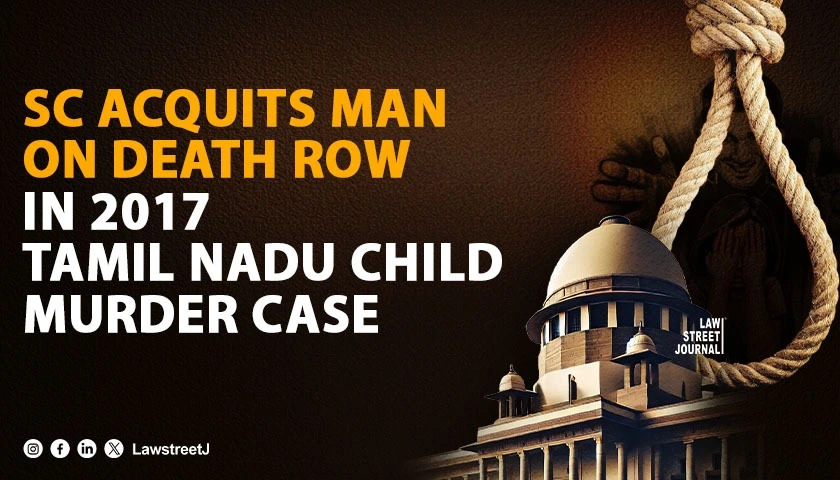NEW DELHI: The Supreme Court has acquitted a man on death row for sexually assaulting and murdering a seven-year-old girl in 2017 in Tamil Nadu, saying prosecution miserably failed to prove its case and the legal framework does not permit the courts to punish an accused based merely on moral convictions or conjectures.
A bench of Justices Vikram Nath, Sanjay Karol and Sandeep Mehta allowed an appeal by Dashwanth against the Madras High Court and the trial court's judgment, finding the trial in the case was conducted in a "lopsided manner" and the accused was made a "scapegoat" by police.
“While it is acknowledged that the acquittal of an individual involved in a heinous crime can lead to societal distress and cause grave anguish to the victim’s family, the legal framework does not permit the courts to punish an accused person based merely on moral convictions or conjectures” Justice Mehta wrote in the 71-page judgment for the bench.
Dashwanth challenged the July 2018 judgment of the Madras High Court, which had upheld the death sentence awarded to him by a trial court.
The court found the prosecution failed miserably to prove the vital circumstances, including last seen together theory, and FSL reports establishing the DNA profiling comparison, on which his conviction was based.
It emphasised, each case must be adjudicated by the courts rigorously on its individual merits and in strict conformity with the law, without yielding to public sentiment and external pressures.
The bench said that while the present case pertained to the commission of a heinous offence involving a girl of tender age of seven years, at the same time, it cannot ignore or bypass the fundamental principle of criminal jurisprudence that the prosecution is duty-bound to prove the guilt of the accused beyond reasonable doubt.
“The onus is heavier in a case based purely on circumstantial evidence. However, regrettably, the prosecution has miserably failed to do so in the instant case, leaving the court with no choice but to acquit the appellant, despite the heinous nature of the crime,” the bench said.
The court pointed out, the appellant was not represented by a defence lawyer and the services of a free legal aid counsel were provided to him on December 13, 2017, after the charges had been framed.
"The constitutional right afforded to an accused to defend himself is not illusory or imaginary and it is the duty of the court and the state to ensure that the accused is not prejudiced or deprived of a fair opportunity to defend himself in a case where he may be awarded capital punishment," the bench said.
The court noted a bare perusal of the sequence of events and proceedings made it clear that right from the stage of framing of the charges, the trial was conducted in a lopsided manner and without due deference to the principles of fair trial.
The bench said it seems that the investigation officers were intentionally trying to screen the truth from being brought on record and washed their hands off the matter, by making the appellant, a scapegoat.
The court also noted the appellant was convicted on February 19, 2018, and on the very same day, the trial judge proceeded to undertake the exercise of hearing him on the aspect of sentence and awarded the death penalty.
The bench said the failure to collect the data from the digital video recorder of the CCTV camera, which allegedly captured the suspicious movements of the appellant on the fateful day, created grave doubt on the bonafides of the investigation agency.
The court also noted there was a serious doubt regarding the entire procedure, whereby, the DNA from the semen stain found on the undergarment of the victim was separated and the same was compared and matched with the DNA profile of the appellant’s blood sample.
The court set aside the appellant's conviction and sentence, and acquitted him of the charges, and directed his release from custody forthwith, if not wanted in any other case.
The trial court had convicted the man for murder and under the provisions of the Protection of Children from Sexual Offences Act.
As per the prosecution case, the victim went missing and her charred body was recovered on February 8, 2017, in furtherance of the disclosure statement made by the appellant, a neighbour. He was arrested on February 8, 2017.
Disclaimer: This content is produced and published by LawStreet Journal Media for informational purposes only and does not constitute legal advice. The views expressed are independent of any legal practice of the individuals involved.















